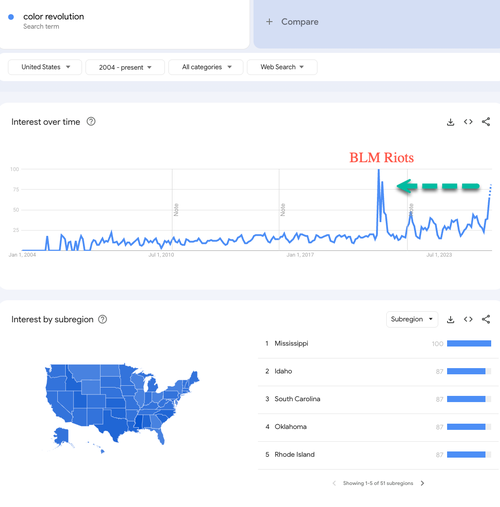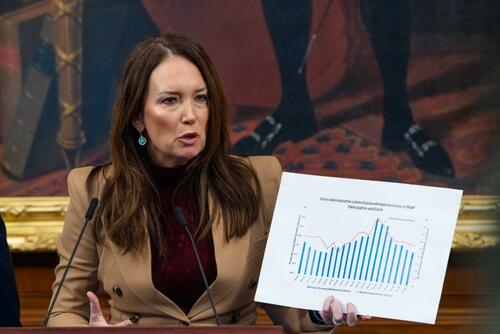(0:00 - 1:39)
In George Orwell's novel, 1984, the populace was largely controlled by the Ministry of Truth, which, through absolute control of the media, information, and education, was able to convince the people to blindly accept the government's narrative. While Orwell's novel was inspired by Stalin's Soviet Union, the irony of the book is that this kind of control has been growing in all countries around the world since before he began writing the book in the late 1940s. In fact, throughout history, the powerful have sought to control the message because they understood that the easiest way to control people was to have their willing cooperation in their own subjugation, and this could be accomplished if they could control what people believed.
In May of last year, I first interviewed Judith Brown, a retired nurse from the UK who, about two years ago, began using her considerable research skills to unmask the so-called fact-checkers to reveal who they really work for and what their role is in controlling the message. Since then, Judith has launched her own sub-stack and has expanded her research into the entire information control and propaganda structure, not just in the UK, but around the world. In this interview, Judith reveals the interconnected web of the globalist's ministry of truth and their complete control over the narrative, not just what people hear, but what they can say and even what they're allowed to think.
(1:46 - 1:53)
Judith, thank you so much for coming back on the show today. Thank you very much for inviting me, Will. It's a pleasure to be here.
(1:54 - 2:07)
And I was so pleased when I found very recently you had started your own sub-stack. For my viewers who missed that in my introduction, I have interviewed you in the past. About a year ago, we talked about fact-checkers, which is something you spent a lot of time working on.
(2:07 - 2:29)
But now that you've got your own sub-stack, you're talking of sort of a broader range of things than that. You're getting into the controlled media as well. And of course, the fact-checker is a part of that.
We'll get into that later. But very recently, you put out this excellent article on conspiracy theory and in the context of the way the media is controlled. So I'd just like to invite you to talk about that article and the conclusions you came to.
(2:30 - 9:54)
Well, I suppose that I started feeling motivated because I just started thinking, well, what is a conspiracy theory? And why are people so against conspiracy theorists? And then I sort of thought, well, actually, I am a conspiracy theorist because I do believe that there are groups of powerful and wealthy people, people like the Bilderbergers, people like the World Economic Forum, governments, the CEOs of big corporations, banks. And they do get together and they do sort of plan our wealth for us, irrespective of what we vote for in elections. They tend to do what they want to do.
And so I started to think, well, really, we should start thinking of the world conspiracy theory in a different way and thinking, yes, we do think there are conspiracies. And I actually found a quote from someone at an American university who said that he was a conspiracy theorist because he believes that the wealthy conspire and went on to say, if you don't think that the wealthy conspire, I call you an idiot. And I sort of thought it was a bit amusing, but I sort of thought there was a lot, there's a lot in that.
So I sort of found someone who was thinking along the same lines as me. So- Coincidentally, that quote was from 2019, just before most of us started to realize, yes, he's right. And I like what you talked about with conspiracy theory, because it all comes to how you want to use that word conspire.
If you're using it in a paranoid sense and it's not true, well, of course it's a theory, it's a crackpot thing. But if you use that word conspire in the sense that you just did, that yes, all of these powerful people do get together and they do conspire, then technically speaking, that is a conspiracy, therefore conspiracy theory, because we're trying to understand what it is that they're doing. Exactly.
And when you look at both fact check groups, and as I've been doing more work on media literacy recently, you can see that people constantly talk about conspiracy theories, and they also conflate different ideas, like for example, flat earthers with people who are suspicious about the effects of the COVID vaccination, or people who think that all of the people like the royal family all died some time ago, and that there are these lizards that impersonate them, and they associate that with people who are critical of some of the, for example, narrative on the climate. So, they sort of proflate these very bizarre theories with really genuine questions that people have. In one book that I read on, which was talking about conspiracy theories, they linked a young man who killed his brother, thinking that he was a lizard, with conspiracy theories, although the book also said he was diagnosed with a mental illness.
Well, if he was diagnosed with a mental illness, it wasn't a conspiracy theory that caused this, it was the mental illness, and so therefore, he was found not guilty of murdering his brother. So, I think that looking at a lot of these books on conspiracy theories, they always assume that the people who are saying narratives, the supposed official narratives, are in fact all doing it for nefarious reasons, for attention, in order to make money through clickbait, and that the real sort of agenda that people should follow is the official narrative. They don't take into account, of course, how official narratives have been wronged so often.
I mean, we all know that there weren't weapons of mass destruction in Iraq, for example. We know that what Hitler was saying in the 1930s, it wasn't logical theory, and yet those events caused wars which killed lots of people, and these were from governments. Of course, there are other things relating to health, such as the thalidomide issue, and the thalidomide issue, adopters and medical professionals were advising people to take a particular drug, thalidomide, and that resulted in a lot of harm to children.
In the same way, in the COVID pandemic, since the pandemic and the lockdown, people have shown that the lockdowns and the non-pharmaceutical interventions caused actually quite a lot of harm. They caused social harm, psychological harm, emotional harm, educational harm, they caused a lot of harms. And then when people evaluate the effect of those non-pharmaceutical interventions, what they find was that the effect of them was negligible.
So therefore, the harms seem to outweigh the benefits, and no government has ever produced a cost-benefit analysis to show otherwise. And so what I'm saying is, you can't believe what official bodies say, you can't believe what governments say, and you can't believe what professionals such as medical personnel say. And really, all of us should be able to investigate those and not be smeared by people who are saying that we're behaving nefariously, or foolishly, or that we're gullible.
They should be taking these sort of queries that people have seriously. I also think, you know, these sorts of rumors, well, they've been around for generations, for millennia. You know, there were, for example, people think that Caesar was murdered because of false rumors that were spreading around about him.
And that caused people to murder him. So, you know, you're talking 2000 years, people have lived with these rumors. Certainly when I was young, there were various old wives tales, which people believed, and yet it didn't really do us any harm.
And so I think that there is a place for maybe training people to not accept facts, but to look critically at those facts. But the difficulty these days as well, there's so much smearing of people, probably like you or I, or even more senior people, parliamentarians, top epidemiologists. So that if people see an article by, for example, Martin Kulldorff, if they look, although he was a top epidemiologist at a top university in America, Harvard, I think, and he therefore had, he made comments on a different way of dealing with the COVID pandemic.
(9:55 - 10:17)
But he was smeared. And if you look on websites now about Martin Kulldorff, if he made any statements, it would say that he was a conspiracy theorist, or that he promoted vaccine hesitancy, or whatever. So- Well, of course, they went after Martin Kulldorff because he was the co-author of the Great Barrington Declaration.
(10:17 - 14:24)
The Great Barrington Declaration. Right. Yeah.
Which obviously, they didn't want people to adopt that policy, and they didn't want governments to adopt it. I think that the only person who did adopt it was DeSantis of Florida. I don't know of any others.
But obviously, the World Council for Health, which you and I both know of, if you look on Wikipedia, it makes very derogatory statements about the World Council for Health. And unfortunately, now, the situation is that if you go onto Wikipedia, you can't correct any false information about yourself or about your organization. Although Wikipedia says that it's an open source, but you can't add citations and also negative stories.
So I think that both fact checkers and, which I want to talk to you about later, media literacy trainers, they actually talk about upsourcing and lateral reading. And by that, bilateral reading may mean if this author has written one article and you think that it's quite good. We've used the example of Martin Kulldorff, for example.
So if you read an article by him or saw a tweet by him, and you want to check him out, and you did an internet search, what you'd find would make you think that he wasn't a person worth following. Or the same with the World Council for Health. And the same with them looking at source.
Again, if you look at the sources, again, if the source isn't one that the government approves, they've already smeared those sources. So if you do upsourcing and lateral reading, you won't find confirmation that this is a good site. Also, there's a tendency to say that alternative news sites may look really good, but actually they're there to fool you.
So this takes away the credibility of, say, journalists like yourself or UK column, for example, in UK, that look like credible news sources. But they're detracting people from looking for their information on Trump. Well, yes, of course.
If you look me up online, I'm a white supremacist and a far right extremist. But I wanted to comment on some things you were just saying, because I think it really holds things together and it provides people with a practical guide in a way for almost assessing who they should be listening to, or at least determine that that's a possible source of good information. Because you were talking about the fact that they won't... When we come up with going for conspiracy theories, the mainstream news or information sources, they won't respond to the argument.
What they do is they turn around slander the person's character. As you were saying, they would conflate something like people who believe in wizard people with those who question the COVID vaccines, and they lump those together. And they were talking about Martin Kulldorff and co-author of the Great American Declaration, a very, very well soundly thought out scientific argument.
Do they try to counter his argument? No, they just attack his character. And so it seems to me, and I've been using this guideline myself now for quite some time, quite honestly, to determine the sorts of people I want to invite to interviews. To what degree are the mainstream sources, not just the news, but social media platforms, what you see commenting from the comments that go on, because we know a lot of those are bots, AIs that are out there to intentionally go after those people.
To what degree has that person's character, not their theories, not their information, their character, been attacked? And when I find someone whose character has been attacked to a great deal, but no responses to their arguments, that's probably somebody I want to talk to.











